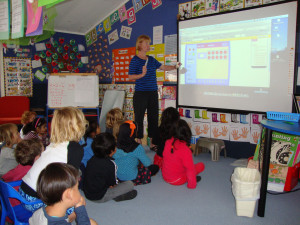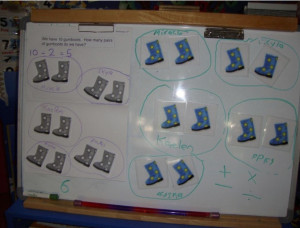Children’s part-whole thinking in mathematics
Research team Brenda Bicknell & Jenny Young-Loveridge
Project Dates: 2013 - 2015
Project Summary
 This was a two-year research project in partnership with two junior class teachers. The study aimed to provide young children from diverse cultures with learning opportunities and challenges within the context of multiplication and division. The goal was to help children develop greater understanding of part-whole relationships in mathematics.
This was a two-year research project in partnership with two junior class teachers. The study aimed to provide young children from diverse cultures with learning opportunities and challenges within the context of multiplication and division. The goal was to help children develop greater understanding of part-whole relationships in mathematics.
The project challenged teachers and children to work with mathematics problems that are not usually given to five and six year-olds. The development of counting skills was the foundation for most learning frameworks but it was important to be open to the possibility that counting was not the only, or even the best way, for students to begin to develop more sophisticated mathematical thinking. This idea was based on several lines of evidence, including studies showing that very young children develop an understanding of very general properties of quantities long before they are able to articulate counting words. The purpose was to expose children to situations and problems where they work with 'groups of' quantities such as pairs of socks (groups of two) and fingers on a hand (groups of five).
The team worked together to plan a variety of learning experiences including choosing suitable materials, games, activities and problems that encourage children to make groups, visualize quantities and become familiar with the composition of numbers as parts within wholes.
Why we did the research
This project was undertaken to build on previous research showing that insufficient numbers of children reach expected levels of achievement in mathematics. Māori, Pasifika, and students from low-decile schools are particularly disadvantaged. We wanted to provide equitable opportunities to develop mathematical thinking in all Strategy domains of the NZ Number Framework.
The aim was to provide children with learning opportunities and challenges within the context of multiplication and division to develop greater understanding of part–whole relationships in mathematics.
Specifically to:
- Provide multiplication problems using groups of two, five, and ten.
- Provide predominantly quotitive division problems with groups of two, five, and ten.
- Help children to make connections between multiplication and division
- Encourage children's use of material and equipment to solve problems
- Encourage multiple representations such as drawings, diagrams, and equations
- Encourage children to work with appropriate quantities (large numbers) that challenge their thinking
How we did the research
 This project utilised design study as an appropriate methodology for research that was undertaken as a partnership between researchers and practitioners The researchers worked collaboratively with teachers in developing a mathematics programme to enhance the development of young children's part-whole thinking, using multiplication and division problem-solving contexts. Data collection methods included semi-structured interviews with teachers, individual diagnostic task-based interviews with the children, observations including video-recorded accounts of classroom activities during the teaching, children's individual project books, and modelling books. Researchers and teachers also kept reflective journals.
This project utilised design study as an appropriate methodology for research that was undertaken as a partnership between researchers and practitioners The researchers worked collaboratively with teachers in developing a mathematics programme to enhance the development of young children's part-whole thinking, using multiplication and division problem-solving contexts. Data collection methods included semi-structured interviews with teachers, individual diagnostic task-based interviews with the children, observations including video-recorded accounts of classroom activities during the teaching, children's individual project books, and modelling books. Researchers and teachers also kept reflective journals.
What we found
The young children in this study showed that they could:
- Solve multiplication and division problems using familiar contexts and materials.
- Work with the idea of 'groups of' (two, five, and ten) and this led to improvement in their number knowledge and problem-solving strategies.
- Use addition, subtraction, and multiplication to check division problems.
- Record problem-solving strategies using multiple representations such as drawings, words, and equations.
- Solve division problems with remainder.
- Make connections between quotitive division by two, and even and odd (remainder) numbers.
- Make connections between quotitive division by ten and place value.
- Self-select numbers to work with in problems that meant that included two-digit and sometimes three-digit numbers.
Who could this help
- Teachers - primary school and early childhood
- Researchers - mathematics education
- Policymakers
Implications for teachers
- The role of multiplication and division in developing children's part-whole thinking.
- The use of quotitive division problems for developing place-value thinking.
Implications for pupils
- Building on the idea of 'groups of' from the beginning of formal schooling.
- Being encouraged and allowed to work with self-selected numbers, including large numbers (e.g. 3-digit numbers).
Implications for researchers
- See outputs for the range of ideas explored in published research including implications and ideas for further research.
Implications for policymakers
- Making more explicit the importance of the idea of 'groups of' and exposing young children to multiplication and division problems.
Project Outputs
2015 Publications
Young-Loveridge, J., & Bicknell, B. (2015). Using task-based interviews to assess early understanding of number. In C. Suurtamm (Ed.), Annual perspectives in mathematics education (APME) 2015: Assessment to enhance learning and teaching (pp. 67–74). Reston, VA: NCTM.
Young-Loveridge, J., & Bicknell, B. (2015). Using multiplication and division contexts to build place-value understanding. In X. Sun, B. Kaur, & J. Novotná (Eds.), Proceedings of the TwentyThird International Congress of Mathematics Instruction (ICMI23): Primary mathematics study on whole numbers (pp. 379–386). Invitational conference, Macau, China. 3–7 June, 2015.
Bicknell, B., & Young-Loveridge, J. (in press). Young children's number-line placements and place-value understanding. Proceedings of annual conference of Mathematics Education Research Group of Australasia (MERGA), Sunshine Coast, Queensland, 28 June–2 July 2015.
Young-Loveridge, J., & Bicknell, B. (in press). Using multiplication and quotitive division contexts to provide foundational place-value understanding. Proceedings of annual conference of the International Group for the Psychology of Mathematics Education (PME), Hobart, Tasmania, 13–18 July, 2015.
Bicknell, B., & Young-Loveridge, J. (in press). Using problems solving and representations to build number knowledge. Proceedings of International Symposium for Elementary Mathematics Teaching (SEMT), Charles University, Prague, Czech Republic, 16–21 August 2015.
Bicknell, B., & Young-Loveridge, J. (under review). Teacher-researcher partnership: Working together to enhance young children's learning in mathematics. In R. McNae & B. Cowie (Eds.), Realizing innovative partnerships in educational research. Rotterdam, The Netherlands: Sense.
Bicknell, B., Young-Loveridge, J., Lelieveld, J., & Brooker, J. (under review). Using multiplication and division contexts with young children to develop part–whole thinking. Set: Research Information for Teachers.
2014 Publications
Young-Loveridge, J., & Bicknell, B. (2014). Developing young children's understanding of place-value using multiplication and quotitive division. In C. Nicol, S. Oesterle, P. Liljedahl, & D. Allan (Eds.), Proceedings of the 38th Conference of the International Group for the Psychology of Mathematics Education (PME) and the 36th Conference of the North American Chapter of the Psychology of Mathematics Education (PME-NA) (Vol. 5, pp. 409–416). Vancouver, Canada: PME.
Young-Loveridge, J. & Bicknell, B. (2014). Supporting the development of number fact knowledge in five- and six-year-olds. In J. Anderson, M. Cavanagh, & A. Prescott (Eds.), Curriculum in focus: Research guided practice. Proceedings of the 37th annual conference of the Mathematics Group of Australasia (pp. 669–676). Sydney, NSW, Australia: MERGA.
2013 Publications
Young-Loveridge, J., & Bicknell, B. (2013). Introducing multiplication and division contexts in junior primary classes. Teachers and Curriculum, 13, 70–76.
Young-Loveridge, J., & Bicknell, B. (2013). Using multiplication and division tasks to support young children's part–whole thinking in mathematics. In J. Novotná & H. Moraová (Eds.), Tasks and tools in elementary mathematics: [Keynote address] in Proceedings of the International Symposium for Elementary Mathematics Teaching: SEMT13 (pp. 55–66). Prague, Czech Republic: Charles University.
Young-Loveridge, J., & Bicknell, B. (2013). Using multiplication and division contexts with young children: Crossing the boundary from counting to part–whole processes. In T. Dooley, S. NicMhuirí, M. OReilly, & R. Ward (Eds.). Mathematics education: Crossing boundaries: [Keynote address] in Proceedings of the Fifth Conference on Research in Mathematics Education: MEI 5, (pp. 33–51). St Patrick's College, Drumcondra, Dublin City University, Dublin, Ireland.
2015 Conference presentations and workshops
Bicknell, B., Young-Loveridge, J., & Simpson, J. (2015, March). Using division problem-solving contexts to build place-value understanding. Workshop presented at the Primary Mathematics Association one-day seminar, Waipuna Conference Centre, Auckland.
Young-Loveridge, J., & Bicknell, B. (2015, June). Using multiplication and division contexts to build place-value understanding. Paper for the TwentyThird International Congress of Mathematics Instruction (ICMI23): Primary Mathematics Study on Whole Numbers. Invitational conference, Macau, China. 3–7 June, 2015.
Bicknell, B., & Young-Loveridge, J. (2015, June). Young children's number line placements and place-value understanding. The 38th annual conference of the Mathematics Education Research Group of Australasia, Sunshine Coast, 28 June–2 July 2015.
Young-Loveridge, J., & Bicknell, B. (2015, July). Using multiplication and quotitive division contexts to provide foundational place-value understanding. Paper for the annual conference of the International Group for the Psychology of Mathematics Education (PME), Hobart, Tasmania, 13–18 July, 2015.
Bicknell, B., & Young-Loveridge, J. (2015, August). Young children's number line placements and place-value understanding. Paper for International Symposium for Elementary Mathematics Teaching, Charles University, Prague, Czech Republic, 17–21 August, 2015.
2014 Conference presentations and workshops
Young-Loveridge, J., & Bicknell, B. (2014, July). Supporting the development of number fact knowledge in five- and six-year-olds. Paper presented at the 37th Annual Conference of the Mathematics Education Research Group of Australasia, Melbourne, Vic, Australia.
Young-Loveridge, J., & Bicknell, B. (2014, July). Developing young children's understanding of place-value using multiplication and quotitive division. Paper presented at the 38th Conference of the International Group for the Psychology of Mathematics Education (PME) and the 36th Conference of the North American Chapter of the Psychology of Mathematics Education, Vancouver, Canada.
Young-Loveridge, J., & Bicknell, B. (2014, July). Developing number fact knowledge for differing contexts. Paper presented at the Science, Technology, Engineering, Mathematics (STEM) in Education conference, University of British Columbia, Vancouver, Canada.
Young-Loveridge, J., Bicknell, B., & Lelieveld, J. (2014, May). Strengthening place value: Using multiplication and division contexts with young children. Paper presented at the Primary Mathematics Association One Day Seminar, Waipuna Conference Centre, Auckland.
Young-Loveridge, J., Bicknell, B., & Lelieveld, J. (2014, May). Strengthening place value: Using multiplication and division contexts with young children. Paper presented at the Waikato Mathematics Symposium, Melville Intermediate School.
Young-Loveridge, J., & Bicknell, B. (2014, May). Using multiplication and division contexts to enhance part–whole thinking in mathematics. Paper presented at the Technology, Environmental, Mathematics & Science (TEMS) Education Research Centre Autumn Seminar Series, University of Waikato. Hamilton, New Zealand.
2013 Conference presentations and workshops
Young-Loveridge, J. (2013, September). Using multiplication and division contexts with young children: Crossing the boundary from counting to part–whole processes. Invited keynote address to the National Conference of Mathematics Education Ireland (MEI5). St Patricks College, Drumcondra, Dublin City University, Dublin, Ireland.
Young-Loveridge, J. (2013, August). Using multiplication and division tasks to support young children's part–whole thinking in mathematics. Invited keynote address to the International Symposium for Elementary Mathematics Teaching (SEMT), Charles University, Prague, Czech Republic.
Young-Loveridge, J., & Bicknell, B. (2013, September). Using multiplication and division contexts with young children to enhance their appreciation of number properties. Invited Address at King's College London, London, England.
Media Output
Television interview 2013
Young-Loveridge, B., & Bicknell, B. (2013). Television interview with Hillary Entwistle about research on multiplication and division with young children. Aired on TV Central (Channel 30), 9 May at 7.55pm and 10.55pm.
Funding
This project was funded through the Teaching and Learning Research Initiative (TLRI).
